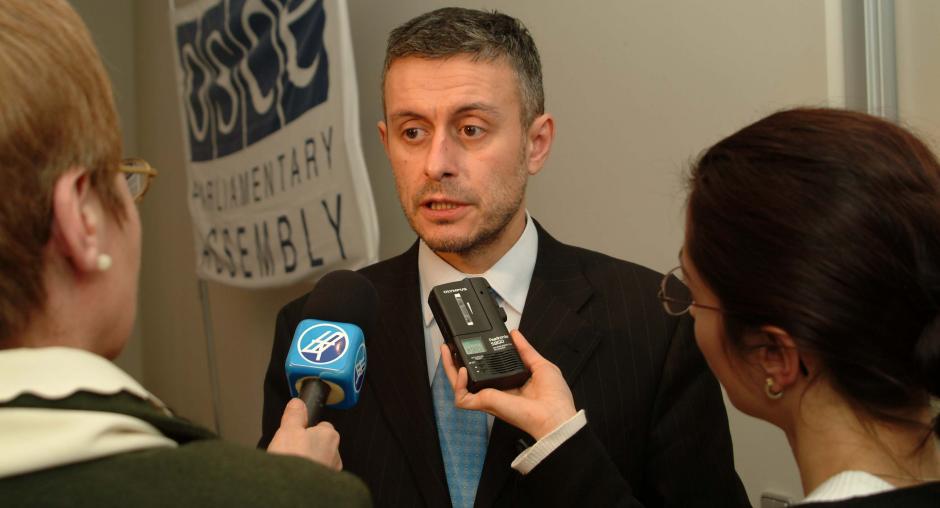Newsroom
OSCE Chairman urges EU support for infrastructure projects in Balkans
BRUSSELS 24 February 2004

(Ayhan Evrensel/OSCE)OSCE Chairman-in-Office, Bulgarian Foreign Minister Solomon Passy, talking to reporters in Vienna, 19 February 2004. (Ayhan Evrensel/OSCE) Photo details
BRUSSELS, 24 February 2004 - The Chairman-in-Office of the OSCE, Bulgarian Foreign Minister Solomon Passy, urged the European Union to take account of political and not just business considerations in deciding whether or not to support infrastructure projects in the Balkans.
Speaking at a meeting of OSCE Troika Ministers with the EU Troika late on Monday, he said support for infrastructure projects was sometimes withheld because they failed to meet normal business criteria.
But supporting economic development in the region, especially in the western Balkans, was essential for ensuring political stability and regional integration.
"We should consider development of infrastructure as a political priority and bring a more political approach, not just a business approach, to bear," the Chairman-in-Office said.
Minister Passy thanked Irish Foreign Minister Brian Cowen, whose country holds the EU Presidency, for the strong support the EU provides for OSCE activities.
The agenda of the meeting, which was attended by EU High Representative Javier Solana, External Relations Commissioner Chris Patten and OSCE Secretary General Jan Kubis as well as the members of both Troikas, included the situation in Moldova, Georgia and Belarus.
On Moldova, the Chairman-in-Office said he hoped a mediators' meeting starting in Belgrade on Tuesday would help to identify common ground and pave the way for a resumption of negotiations in the so-called 5-sided format.
"Although we are realistic about the prospects for rapid progress in the months ahead, we are confident that the two sides will progressively re-engage in the negotiation process," he said.
Minister Passy said the OSCE hoped, with EU support, to provide long-term assistance for Georgia, going beyond next month's parliamentary elections, to ensure fundamental reform of the electoral system and assist in the areas of law enforcement, good governance and fighting corruption.
The EU representatives expressed support for the work of the OSCE Office in Minsk and its Head, Ambassador Eberhard Heyken of Germany.
Speaking at a meeting of OSCE Troika Ministers with the EU Troika late on Monday, he said support for infrastructure projects was sometimes withheld because they failed to meet normal business criteria.
But supporting economic development in the region, especially in the western Balkans, was essential for ensuring political stability and regional integration.
"We should consider development of infrastructure as a political priority and bring a more political approach, not just a business approach, to bear," the Chairman-in-Office said.
Minister Passy thanked Irish Foreign Minister Brian Cowen, whose country holds the EU Presidency, for the strong support the EU provides for OSCE activities.
The agenda of the meeting, which was attended by EU High Representative Javier Solana, External Relations Commissioner Chris Patten and OSCE Secretary General Jan Kubis as well as the members of both Troikas, included the situation in Moldova, Georgia and Belarus.
On Moldova, the Chairman-in-Office said he hoped a mediators' meeting starting in Belgrade on Tuesday would help to identify common ground and pave the way for a resumption of negotiations in the so-called 5-sided format.
"Although we are realistic about the prospects for rapid progress in the months ahead, we are confident that the two sides will progressively re-engage in the negotiation process," he said.
Minister Passy said the OSCE hoped, with EU support, to provide long-term assistance for Georgia, going beyond next month's parliamentary elections, to ensure fundamental reform of the electoral system and assist in the areas of law enforcement, good governance and fighting corruption.
The EU representatives expressed support for the work of the OSCE Office in Minsk and its Head, Ambassador Eberhard Heyken of Germany.
